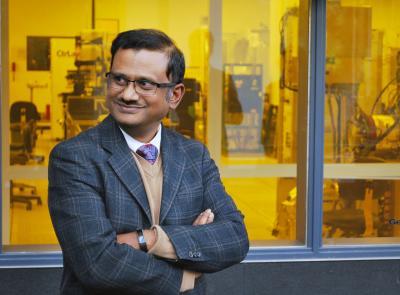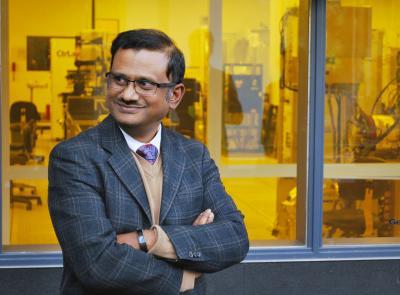Marcus Center leading three-year collaborative effort with GTRI, ISyE and Duke University

The Georgia Institute of Technology’s reputation as a leader in cell manufacturing received a boost recently when it was awarded a three-year, $1.8 million grant from the U.S. Food and Drug Administration to develop a scalable manufacturing system for cord-tissue derived cells.
“The goal is to ultimately translate cell-based therapies through new engineering tools and better manufacturing practices,” said principal investigator Krishnendu Roy, director of the Marcus Center for Therapeutic Cell Characterization and Manufacturing (MC3M) at Georgia Tech, which will lead the three-year effort. “This will be a multi-faceted project requiring the expertise of some great collaborators.”
Working with clinicians at Duke University, Roy and his Marcus Center team are partnering with robotics experts at the Georgia Tech Research Institute (GTRI), and researchers in Tech’s H. Milton Stewart School of Industrial and Systems Engineering (ISyE) on the three-year effort.
Duke is home to one of the nation’s oldest cord blood banks as well as a Marcus Center (the Marcus Center for Cellular Cures, or MC3), both directed by Roy’s co-principal investigator on the FDA grant, Joanne Kurtzberg, whose team already is engaged in several clinical trials utilizing cord blood and cord-tissue derived therapeutic cells.
But rather than therapeutic development, the FDA grant is focused mainly on advanced manufacturing, with emphasis on “identifying critical attributes of cells relevant to their function, then figuring out ways to use bioreactors for larger scale production, then automating some of the processes and developing sensors to monitor cell quality and culture over time,” said Roy, the Robert A. Milton Chaired Professor in the Wallace H. Coulter Department of Biomedical Engineering at Georgia Tech and Emory University, and a researcher with the Petit Institute for Bioengineering and Bioscience at Tech.
Researchers at GTRI will work on developing automation platforms while ISyE personnel are developing flexible electronics sensors to interface with bioreactors, he added, “and the Marcus Center at Georgia Tech, is combining everything into an integrated scalable production platform with functionally-relevant cell quality control.”
The FDA grant bolsters Georgia Tech’s existing cell manufacturing ecosystem, which includes the NSF Cell Manufacturing Technologies (CMaT) Center as well as the Marcus Center, both under Roy’s direction, both trying to meet a critical need to develop new engineering tools for effectively scaling up production of innovative cell therapies while ensuring reproducibility and high quality.
That led to a logical partnership with MC3M and Georgia Tech’s engineering expertise.
“Advanced manufacturing technologies hold great promise for improvements in the reliability, flexibility, and cost effectiveness of manufacturing for biological products,” said FDA Commissioner Scott Gottlieb. “These platforms may be critical to unlocking the full potential of novel technologies like cell and gene therapies, and new vaccines.”
The FDA awarded five grants to foster innovations in advanced manufacturing technology. The recipients were Harvard University, Carnegie-Mellon University, Rutgers University, the Massachusetts Institute of Technology, and the Georgia Tech-Duke partnership.
“This is an exciting opportunity,” said Carolyn Yeago, associate director of research for Georgia Tech’s Marcus Center, who will be directing the different moving parts of the FDA-supported project. “We’re exposing our engineers at Tech directly to the clinical side. The whole impetus for this grant came from Dr. Kurtzberg’s need to generate a lot of cells, reliably and efficiently.”
For the Marcus Center, it’s an opportunity to have an impact on the cell therapy industry, and cell therapies used in clinical practice and trials, said Roy.
“The aim is to make these therapies available not just to a few patients, but thousands of patients,” he added. “We really need new, scalable manufacturing tools and platform technologies to make that happen, and this support from the FDA will help us figure some of that out. This is a way for us to leverage the resources that we have been developing at the Marcus Center and at CMaT as well through investment from the State of Georgia.”
